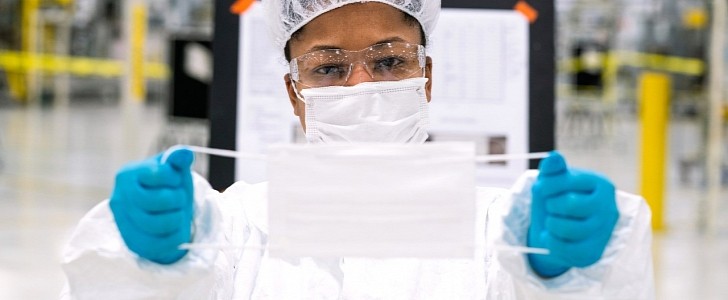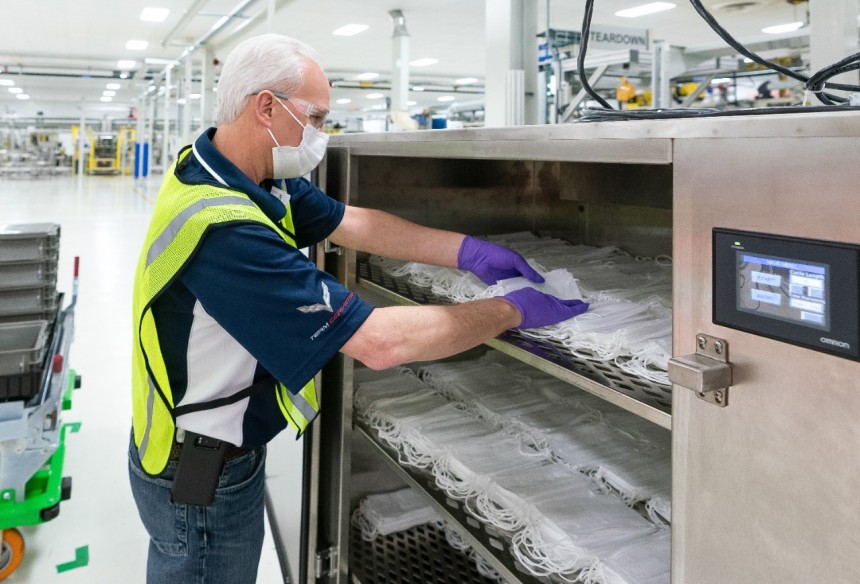Maybe you were thinking that this virus stuff is fake. Maybe you were thinking it’s real. Whatever you thought, GM, one of the world’s largest automobile manufacturers has restructured production lines to aid in the production of medical masks.
In response to the global health crisis, which eventually hit U.S. shores pretty hard, GM was one of the carmakers that put their thinking caps on and responded. Only one week after announcing their current objective in aiding workers fighting on the front-line against the virus, GM pulled its first sample mask off the assembly line.
“Our team began looking at ways we could quickly utilize our talents and resources to help in the shared fight against COVID-19. Working around the clock, our team rallied with incredible passion and focus to come up with a plan to produce masks that will help protect the women and men on the front lines of this crisis” said Peter Thom, GM vice president, Global Manufacturing Engineering.
As we know, GM works with a wide network of suppliers for its base materials in cars, so it just makes sense to produce something like this. To produce masks of this type, fabrics are required, so GM shifted its attention to fabric suppliers and equipment.
Partners of GM, typically specialized in producing insulation, liners, and other fabric-like components, were called upon and answered the switch to mask production. Equipment to produce the three layers of material and the ear-loops was developed.
Sure, GM has had to do some work regarding the restructuring of their equipment and methods, but in the end it’s for the greater good.
For example, the “mask-maker,” as it is dubbed, is a machine that GM did not have in any of their facilities, so they designed one from scratch. it’s meant to fold, fuse, and cut the continuous flow of material the machine is fed, into individual masks.
Other equipment, which is already used in automotive applications, like sonic welders, have only seen a slight shift in everyday duties. These are now used to bond the ear-loops to the base mask.
Next a quick twenty-minute sterilization phase commences, followed by the bagging phase. Here, the masks are bagged, labeled, and finally ready for shipping.
While operating at full capacity, GM estimates 1.5 million masks can be produced monthly.
About the first production run Peter Thom adds, “Not only did the team make their goal, but they over-delivered. They actually beat our deadline, running the first mask through the equipment 30 minutes ahead of target. We’re excited because this means we’re even closer to being able to protect the healthcare teams who are working tirelessly to save lives.”
That’s not all. GM and affiliates have also produced 66,000 face-shields and 600 ventilators. And that number is promised to rise. It seems that the benefits of producing such equipment not only makes sense in times of crisis, but can be beneficial even in the long-run.
Lower costs can be transferred to the customer as less shipping and handling would be required. And faster delivery times to the services in need. Plus, we always feel better when it’s something made in your own backyard. From b-b-q’s, to cars, to the dirty, home is where the heart is.
“Our team began looking at ways we could quickly utilize our talents and resources to help in the shared fight against COVID-19. Working around the clock, our team rallied with incredible passion and focus to come up with a plan to produce masks that will help protect the women and men on the front lines of this crisis” said Peter Thom, GM vice president, Global Manufacturing Engineering.
As we know, GM works with a wide network of suppliers for its base materials in cars, so it just makes sense to produce something like this. To produce masks of this type, fabrics are required, so GM shifted its attention to fabric suppliers and equipment.
Sure, GM has had to do some work regarding the restructuring of their equipment and methods, but in the end it’s for the greater good.
For example, the “mask-maker,” as it is dubbed, is a machine that GM did not have in any of their facilities, so they designed one from scratch. it’s meant to fold, fuse, and cut the continuous flow of material the machine is fed, into individual masks.
Other equipment, which is already used in automotive applications, like sonic welders, have only seen a slight shift in everyday duties. These are now used to bond the ear-loops to the base mask.
Next a quick twenty-minute sterilization phase commences, followed by the bagging phase. Here, the masks are bagged, labeled, and finally ready for shipping.
While operating at full capacity, GM estimates 1.5 million masks can be produced monthly.
That’s not all. GM and affiliates have also produced 66,000 face-shields and 600 ventilators. And that number is promised to rise. It seems that the benefits of producing such equipment not only makes sense in times of crisis, but can be beneficial even in the long-run.
Lower costs can be transferred to the customer as less shipping and handling would be required. And faster delivery times to the services in need. Plus, we always feel better when it’s something made in your own backyard. From b-b-q’s, to cars, to the dirty, home is where the heart is.







